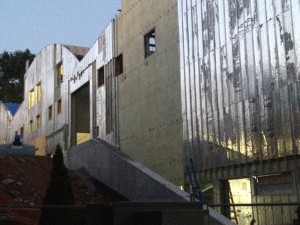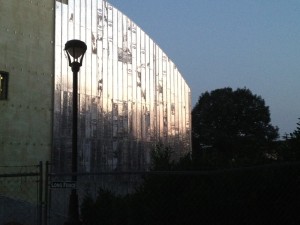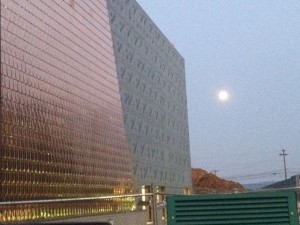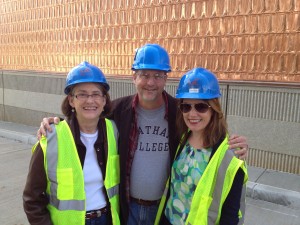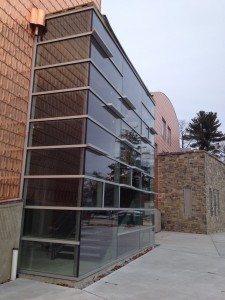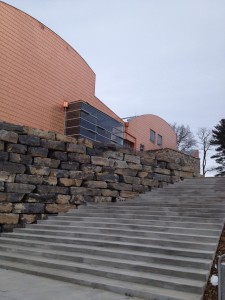Playwright Richard Dresser gave the 2009 Commencement Address at Shepherd University on Saturday. He also received an Honorary Doctorate from Shepherd University President Suzanne Shipley.
As you know the Contemporary American Theater Festival is hosted by Shepherd University. We enjoy a long and productive partnership with Shepherd. I am thrilled that President Shipley asked Richard Dresser to give the Commencement Address. Please take a moment and read Rick’s talk to the 2009 graduates and let me know what you think . . .
SHEPHERD UNIVERSITY COMMENCEMENT
May 11, 2009 Richard Dresser
Thank you. When President Shipley called me in November to ask if I would be your commencement speaker, I was truly honored. She then asked if I had my own academic regalia. I told her not only do I have my own cap and gown, I just happen to be wearing it on this Tuesday morning, sitting alone by the telephone, waiting for a college president to call. So I am delighted to be here.
But this isn’t about me. This is about you, and what you have achieved over the past four years. Or five or six or seven, depending on how leisurely your journey has been through academia. If you look around you will see many people who are proud of you. You have done something noteworthy today. You have fulfilled other people’s expectations. And that’s to be applauded.
But what you will do next is far more challenging, painful, awkward, daunting, terrifying, and exhilarating.
You must now fulfill your own expectations.
And that’s what I’d like to talk to you about over the next two hours and forty-five minutes, which is all the time that President Shipley has given me.
After this ceremony, many people will ask you what you intend to do next. Perhaps you know. Perhaps you don’t and you will lie to them. Perhaps it’s none of my business. But whatever you tell them, it’s the question you’re all facing. Where do I go from here? And will I need a new coat?
When you’re trying to find an answer to that, in the darkest hours of the night, you will inevitably come up with ideas that are grandiose, foolish, laughable, borderline insane, and far too embarrassing to ever tell your parents. These are the ideas you should pay attention to. Write them down so you won’t forget them. In one form or another, this is what is in your heart. The crazy, the unpredictable, the illogical, whatever it is, find the thing that drives you.
No one else can tell you what that is. But it is what sets you apart from the pack, and it will be the source of your greatest strength. It is to be trusted.
I know you’ve all been consumed with academics and perhaps you haven’t been paying much attention to what’s going on out there in the world. Now I don’t want to be the bearer of bad news on such a glorious day, but I feel I should tell you there’s been a global economic meltdown. The world is profoundly different than it was last year. I hope this isn’t too much of a shock. It’s been in all the papers.
As a result, many people seem to think that this is a rotten time to be graduating from college. I respectfully disagree. When things are rolling smoothly along, there’s a big club and you aren’t in it. Everyone’s pretty sure they’ve got it all figured out so why do they need you?
But right now, everything’s up for grabs. There are lots of things that need fixing, lots of people who need help, and there’s a planet that’s crying out for attention. So we need your ideas and your energy and your optimism. Desperately. If you stay open to what’s happening around you, there are truly exciting opportunities in times of transition like this.
But let’s be honest—these are difficult times for many people. And in such a perilous climate, the tendency is to try to find something safe. Something that will get you through the hard times. I’m going to save you a lot of time right now by telling you that making the safe choice is in fact the riskiest thing you could do. Forget about making a safe choice. It’s too dangerous.
The truth is, there are no safe choices. Whatever seems safe today will probably seem ludicrous in ten years. If you don’t believe me, talk to someone who’s trying to pursue a career delivering ice or repairing typewriters or working the switchboard at Western Union. These were once growth industries that no longer exist. You’d do better to talk to someone who’s hunkered down in his garage building a flying car. The fact is, the jobs that many of you will be doing in the future don’t exist today. So if we live in troubled times and there are no safe choices, and the job you will probably doing in the future doesn’t yet exist… what should you do? How do you prepare for a job that doesn’t exist?
That’s an excellent question, and I’m glad you asked it. Fortunately, and this is why you all are so unbelievably lucky to have me as your commencement speaker, I have the answer.
I’m going to tell every one of you what your absolute best choice is. Your mission—and it’s not as easy as it sounds—is simply to find out what you love doing. And then pursue it with all your heart. And when someone tells you that you aren’t good enough or there’s too much competition or they don’t need you, well, you should thank them because that’s the little push you need to go at it with even greater intensity. Revenge is a wonderful motivator. I know. I work in show business.
If you do this—if you pursue what you love you will enjoy a working life without regrets. But if your life is dedicated to fulfilling someone else’s expectations, you will be haunted by the road not taken. You’ll never know what you could have done. I don’t wish that on any of you.
And let me assure you that the risky choice—taking a leap based on passion—is in fact the safest choice you can make. The most successful people I know have one thing in common—and it isn’t where they went to college or what their grades were or who their parents are or what kind of connections they had.
They love what they do. It’s really that simple. This doesn’t stop them from complaining about it, it doesn’t protect them from the harsh blows that life will inevitably deal to us all, it doesn’t mean they wake up smiling every day.
But it means they are driven by passion rather than obligation. And I would always bet on the person driven by passion. They will work longer and harder and they will find a way to succeed.
So the risky choice—taking a bold leap into a scary world armed with whatever you love—is in fact the safe choice. Because your chances of succeeding are far greater. And why spend your life trying to succeed at something you don’t care about? Now some of you may already know what you love to do. I applaud you. You are very fortunate indeed.
Personally, I wasn’t that lucky. When I got out of college I didn’t have a clue. So I embarked on a series of jobs which included serving up fast food, working as a security guard watching over convicts, operating a machine in a factory which made GI Joe’s thighs, editing college textbooks, working in a warehouse, loading trucks, and for six excruciating hours doing telephone sales.
Whatever this is, it isn’t a traditional career path. Fortunately, I drifted into a job doing radio news in a tiny station in western Massachusetts. This seemed like the start of a reasonable course of action, something I could call a career instead of a job. Finally, I was on my way.
I decided I needed to get further training so I went to graduate school in Chapel Hill NC. This was a very logical plan and it worked out perfectly until I was forced to take a course in theater. It seemed silly. What did this have to do with my chosen field?
I dutifully set out on the first assignment, which involved writing dialogue. And from practically the first line of dialogue I wrote I was hooked. It was like a narcotic and I knew without any doubt I was going to do more of this. A lot more.
My perfectly reasonable plan for a career in broadcast journalism was out the window and I plunged into the theater in my late twenties with no training, no experience, no connections, no background, no idea what working in the theatre even meant. But I was armed with a fierce desire to make something happen and I had the added incentive of not being remotely qualified to do anything else.
Now I don’t recommend any of that. Particularly telephone solicitation. But I also don’t regret it, because taking every semi-demented detour and blind alley I could find ultimately led me to the place I was looking for.
We all have to make a living and we all have to find our place in the world. You can rationalize what you do and you can convince yourself that any number of jobs makes sense. But you can’t fool yourself about what you love doing.
Again, I don’t want to be the bearer of bad news, but we’re all on a one way trip. I’m assuming you’ve encountered this concept of mortality in one of your classes or hidden somewhere in the fine print.
It’s a tremendous ride we’re on but it goes by far more quickly than you can imagine. We already know how the story ends for all of us. So let that liberate you to have the most extraordinary life you can imagine. I urge you to aim high. This is your time.
With passion, with hope, with knowledge, and by staying open and alive to what’s around you, you can truly change the world. And if you play your cards right you can have one hell of a good time doing it. Thank you.
 Construction continues on Phase Two of Shepherd University’s Center for Contemporary Arts. This joint project of the University, CATF, and the Shepherd University Foundation was a key component of the recently completed Shepherd comprehensive campaign known as CREATE. The $13.5 million facility should be completed by March. It will include a brand new 185-seat theater (special announcement coming soon!), a sculpture studio, costume and scenery shops, graphic design studios, a rehearsal and small performance room, a small art gallery, and theater support areas like dressing rooms, lobby, etc. Plus, the exterior patios are gorgeous and will lend themselves to special events. The terrific team at Holzman Moss Bottino Architecture have done a great job, as have the construction company Morgan Keller. It’s going to be a great venue for CATF patrons to take in a show and gets us one step closer to our dream of having our full repertory take place in one multi-building complex. Next step? Phase Three…..stay tuned.
Construction continues on Phase Two of Shepherd University’s Center for Contemporary Arts. This joint project of the University, CATF, and the Shepherd University Foundation was a key component of the recently completed Shepherd comprehensive campaign known as CREATE. The $13.5 million facility should be completed by March. It will include a brand new 185-seat theater (special announcement coming soon!), a sculpture studio, costume and scenery shops, graphic design studios, a rehearsal and small performance room, a small art gallery, and theater support areas like dressing rooms, lobby, etc. Plus, the exterior patios are gorgeous and will lend themselves to special events. The terrific team at Holzman Moss Bottino Architecture have done a great job, as have the construction company Morgan Keller. It’s going to be a great venue for CATF patrons to take in a show and gets us one step closer to our dream of having our full repertory take place in one multi-building complex. Next step? Phase Three…..stay tuned.
